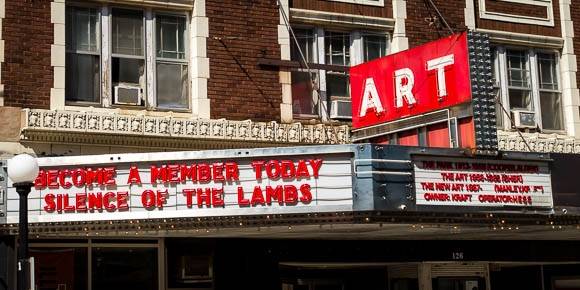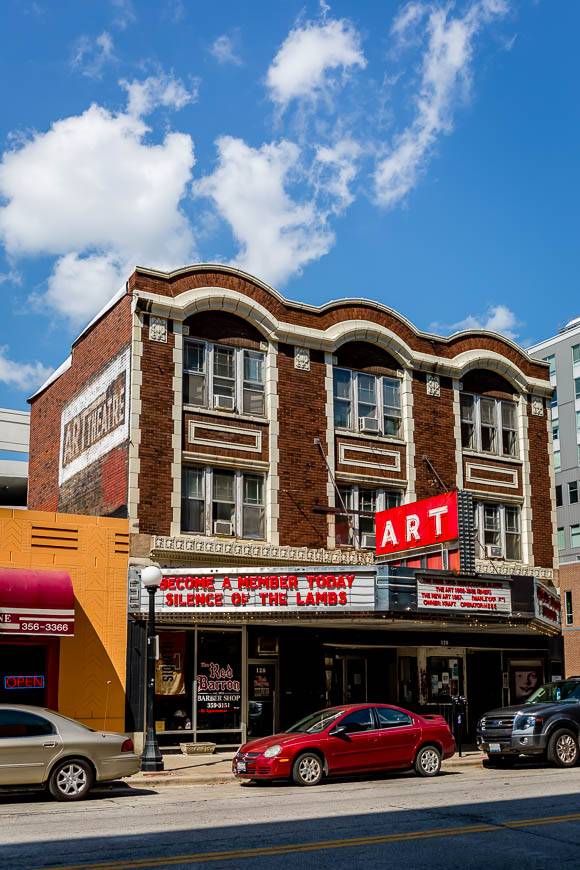(Pictured below, I swear that’s not a threat…)

Recently having signed a 10-year lease for their current location, the Art Theater Co-Op knew it had to do something to increase its stability. General Manager Austin McCann’s proposed solution has become known as “Membership”. As opposed to Ownership, the shareholding that the co-op was based upon, Membership is a donation to the non-profit business that recurs annually and entitles the Member to discounts and exclusive events that Owners do not get.
 A majority of art-house cinemas have some kind of discount program like this, so many so that there is a national consortium of cinemas that recognize each other’s membership cards: The Art House Convergence’s “Visiting Members Program” (something that may be in the future for our Art, stay tuned). And a large portion of art-house cinemas operate as non-profits. But as far as I know, our town has the privilege of creating America’s first co-operatively owned movie theater, leading the way for at least one other (I don’t count the one that Michael Moore paid for and then “gave to the people”). Even then, our town did it faster and cheaper than the Minnesotans, their shares cost $250 as opposed to our $65, and we both had the same end goal — about $100,000 to buy a digital projector and keep our historic theaters open.
A majority of art-house cinemas have some kind of discount program like this, so many so that there is a national consortium of cinemas that recognize each other’s membership cards: The Art House Convergence’s “Visiting Members Program” (something that may be in the future for our Art, stay tuned). And a large portion of art-house cinemas operate as non-profits. But as far as I know, our town has the privilege of creating America’s first co-operatively owned movie theater, leading the way for at least one other (I don’t count the one that Michael Moore paid for and then “gave to the people”). Even then, our town did it faster and cheaper than the Minnesotans, their shares cost $250 as opposed to our $65, and we both had the same end goal — about $100,000 to buy a digital projector and keep our historic theaters open.
 As an early co-op owner and naturalized townie, I think that’s pretty awesome. So when this Membership business was announced, I was a little confused. Didn’t we already have a mechanic in place to ensure our theater’s stability? By giving them my $65 and patronizing the place as often as possible, sometimes multiple times a week, wasn’t I helping ensure the future of our unique and incredible establishment? With a lower price-point, and more immediately recognizable benefits, was Membership going to edge out Ownership? I asked to talk with McCann, the GM, and Leigh Estabrook, chair of the Board of Directors, and it turns out the answers were “Nope”, “Eh”, and “Maybe?” in that order.
As an early co-op owner and naturalized townie, I think that’s pretty awesome. So when this Membership business was announced, I was a little confused. Didn’t we already have a mechanic in place to ensure our theater’s stability? By giving them my $65 and patronizing the place as often as possible, sometimes multiple times a week, wasn’t I helping ensure the future of our unique and incredible establishment? With a lower price-point, and more immediately recognizable benefits, was Membership going to edge out Ownership? I asked to talk with McCann, the GM, and Leigh Estabrook, chair of the Board of Directors, and it turns out the answers were “Nope”, “Eh”, and “Maybe?” in that order.
According to both McCann and Estabrook, the Co-Op model was strictly to get The Art over the hump and keep its doors open. With the digital conversion looming, there was no way to continue doing business without a quick injection of cash, and turning to the community for donations was the fastest way to accomplish that. McCann told me, “In the original business plan, they planned for an initial huge influx of owners and then a trickle every year after.” Estabrook says, “Ownership shares still provide a small cash reserve held aside for critical needs.”
Both of them continue on to emphasize the Membership as a promising way to do more than survive, but to improve the theater’s physical presence as well as its programming, and to continue to grow the business. I was surprised to hear that, and when I asked whether Ownership was ever intended to help the theater meet its goals and grow, McCann’s answer was a flat “No.”

McCann spoke about how unprofitable the business was before the Co-Op took over: prices were too low and there were inefficiencies other than the horrible air-conditioning/blower combo. With a price increase and some good films opening, The Art was able to cover its costs by 2014, making up for deficiencies in 2012 & 2013. You may be thinking that a non-profit doesn’t need to be… profitable. But our theater still has only one full time employee, McCann, who does all of the programming, event planning and daily administration. Some maintenance and physical improvements were budgeted, the AC was upgraded, but last night the theater had to cancel its shows because the work on the roof isn’t complete and the downpour made it impossible to stay open. The doors are a nightmare, especially for people with disabilities, but they have to consider the Historic Preservation Society when making improvements to the building.
McCann is happy with some of the business changes, saying that he is on track with his profits from concessions, although one could always do better. He also talked about how some of the most profitable films shown at The Art last year were some of his favorites, and it was a good year for not needing to chase commercial films quite as much. Estabrook spoke to the delicacy of the business, however, reminding me that “40 percent of ticket prices are returned to the film distributor and ‘art films’ that might be a commercial success are more frequently booked at the commercial venues like The Savoy.” While, as an owner, I always choose The Art if I have a choice of venue between films, I take her point. Not everyone is so conscientious, even those that invested initially three years ago. They agree that there’s a balancing act that takes place, and while they want to be showing more challenging films, but “that’s not the point because people say ‘Who are the actors in it, I didn’t see any ads for it on TV, why would I go see a movie that fewer people are talking about?” Finding the rare film that will satisfy both concerns is a difficult job, and one that would be easier if they had more profit to work with.
That “maybe” is entirely my opinion, but it is a conclusion based on some of the answers (and non-answers) I got from both parties. In an hour of interview, Austin pointed out that the business’ emphasis is currently on Membership no fewer than five times. He told me that the Co-Op business model was “a distinct disadvantage” because it does not allow for recurring donations. To McCann, membership is the way around that, saying “no matter what happens long-term with the fact that we are a non-profit, cooperatively owned corporation, this is the way that we can find financial stability from people, AND to be able to offer them clear discounts and incentives… It’s much easier for me to work with. It’s a much easier way for me to run this business successfully.”
Furthermore, he speaks of the concept of ownership moving forward dismissively, saying “the big function of the Co-op, [is to] have this organization steered by the community. And we still have that. If people want to be able to vote for the board of directors, and come to those meetings, then they can still sign up to be members. Our focus right now is on the annual membership.” Leigh also talks about Ownership in the past tense, saying it was a way to “revive the Theater at a time when the former owner could no longer sustain it,” and that “Membership dollars are giving us the chance to make the experience of movie-going to the Art ever better.”
When I asked if a possible solution was to entice more Owners, the reply was “It’s a small town. We have 1500 owners, which is a hell of a lot of people,” despite that this figure is only slightly more than 1% of C-U’s permanent population, and only slightly more than one-half of 1% of the population of the county. Considering we’re smack-dab in the middle and most of the county considers us to be “town”, it’s not unreasonable to think most would drive here for a night at the movies.
I love The Art. I go there often. I put it in The Weekender. I SPlog about it. I want it to be successful and stay open for its entire 10-year lease and beyond. I’ll admit, I love that it’s unique in the nation and that I’m a part of that, as an Owner. Also, this whole article started because I felt conflicted — as an early Owner, there were vague promises made about owners getting benefits and discounts, and those promises never really panned out. During our conversation, Austin explained that to my satisfaction, still, I’m left with an uneasy feeling about Membership being the future of the business. To me it feels more business-y than Co-Op-y, focusing on money instead of people. I know, the place needs money to improve, and I want to give that to them. I’d love to see more people involved with The Art, instead of the same people giving more money.
Although let’s face it, most Owners will be buying Memberships regardless, because they feel like I do, and that is awesome (especially because Owners get an extra pair of tickets if they sign up in 2015). But let’s get more of C-U on Board. Literally…Owners… Board… get it? C’mon. 1% of us love movies? That’s ridiculous. It’d be fabulous to see more people as Owners, to keep this place a Co-Op that is focused on people, and our community.
At the end of our interview, I asked McCann what else he’d like to say, and he concluded with, “Just that it’s a privilege and a pleasure to run this place. We have a really great staff who like working here, our audiences are awesome, people are really positive and supportive, and we’re really grateful for that. We’re doing what we can to make this place the best it can be.” Why wouldn’t you want to be a part of that?
Photos by Scott Wells.








